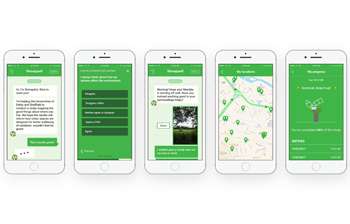Smartphone app could reveal how urban spaces affect our health and wellbeing

A new smartphone app designed to show how urban environments affect people's health and wellbeing has been launched this week (14 July 2017).
The app, which is part of the Improving Wellbeing Through Urban Nature project (IWUN) led by the University of Sheffield, enables city residents to map good things they encounter in their city. The aim of the project is to help urban planners, designers and public health organisations create better urban spaces for people and wildlife.
Launched initially for people living in Sheffield, the app, developed in collaboration with researchers from the University of Derby with Sheffield and Rotherham Wildlife Trust and Furthermore Ltd, prompts people to notice good things about their surroundings. It also records users' locations and activity, which could reveal new insights into the types of spaces people encounter in cities and how different spaces affect their wellbeing.
Dr Anna Jorgensen, who is leading the project from the University of Sheffield's Department of Landscape Architecture, said: "There have been numerous studies that have looked at how urban public spaces affect people's health and wellbeing, but what is different about our project is that we have produced a smartphone app which allows people to track how they instantly respond to their surroundings, and enables us to identify precisely which places in their city, and which characteristics of those places, are making a positive difference to people's health, wellbeing and overall quality of life. These findings are important because they could be used to improve the types of spaces that are created in cities."
The smartphone app - Shmapped- collects baseline wellbeing data through brief questionnaires and prompts users to map good things in their city and rate each location.
Dr Miles Richardson from the College of Life and Natural Sciences at the University of Derby, said: "Shmapped is based on previous research we conducted which shows the importance of noticing the good things around you. Running the study via a smartphone app allows some incredibly rich data to be collected with participants able to map, note and photo the good things they see. The conversational style and focus on good things creates an app that is enjoyable and engaging in its own right, which is certainly novel for a research study of this scale and complexity."
The research team is now looking for city residents to download the app and take part in the study to map what type of natural and built spaces benefit their wellbeing the most. The app is free to download and participants need to use it for at least one month to be included in the study.
Dr Kirsten McEwan, Researcher in the College of Life and Natural Sciences at the University of Derby, said: "The great thing about Shmapped is it will allow us a unique insight into the type of natural and built spaces people encounter in their day-to-day life and what type of spaces benefit their wellbeing more than others. Knowing what it is about these spaces that benefits wellbeing, will help us to inform urban planners and designers and public health organisations about how to create better urban spaces for people and wildlife."
Linda Baldwin, Community Engagement and Learning Manager for Sheffield and Rotherham Wildlife Trust, said: "We're delighted to be working with the Universities of Derby and Sheffield to promote Shmapped and gain valuable insight into how people's urban experiences are shaped by their surroundings. The app gives people an opportunity to get out and about in their local area, and record the good things about where they live in a fun and engaging way."
Hana Sutch, Director at Furthermore and Co-Founder at Go Jauntly, who was part of the team behind the design and development of the research app added: "We are absolutely delighted to be part of this team and study as it is very closely aligned with our own thinking. There is a growing body of evidence that the design of built areas and green spaces in cities has a direct impact on residents' wellbeing. With population growth in cities ever-increasing, it's really important that cities are better designed for humans and wildlife alike.
"The Shmapped app and its Shmapbot, helps to start this conversation and make it easier for participants to capture the good things that they notice about Sheffield - and beyond. We have no doubt that the data captured and new insights it produces will go on to influence products like Go Jauntly, a platform we created to help people discover walks and reconnect with nature, as well as other future cities products, services, buildings and spaces and in turn have a positive impact on the overall health and wellbeing of the general public."
More information: For more information on the study and to download the app, please visit: iwun.uk/shmapped/
Provided by University of Sheffield

















